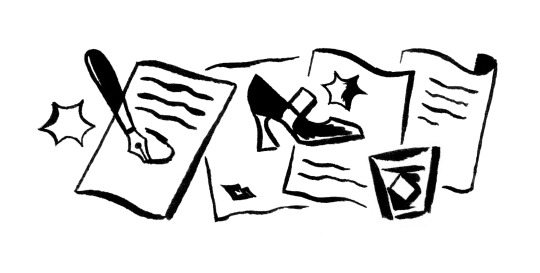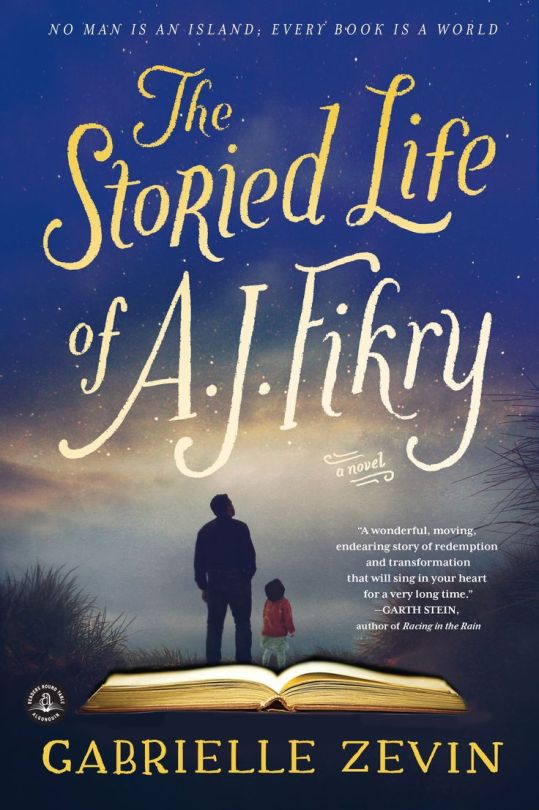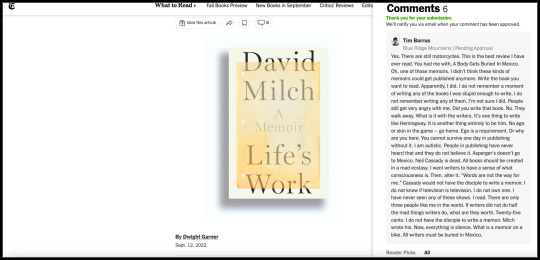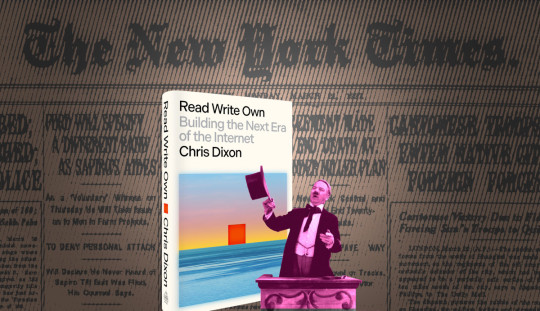#NYT Book Review
Text
Spotted the word "blorbo" in The New York Times book review. Listen NYT romance reviewer, I really do not think your paper's audience is going to recognize that one
10K notes
·
View notes
Text

Spot for The New York Times magazine, Oct 22 2023
45 notes
·
View notes
Text
Anthony Lane
I've been reading the same Anthony Lane book reviews over and over, and damn it, The New York Times Book Review got to it first: "Lane writes prose the way Fred Astaire danced; his sentences and paragraphs are a sublime, rhythmic concoction of glide and snap, lightness and sting."
Reading his reviews is like a fizz that won't stop, an irresistible tartness that makes you pucker. Anthony Lane is a dandy with wits.
I hate the amateurish idea that sentimentality equals good writing. I suspect when writers attempt poignancy, they feel the usual fare just won't cut it (This is Death we're talking about; and that calls for the good silver). Truth be told, the usual fare doesn't cut it, if you're not Anthony Lane, but nothing more fattening will either. These wannabes are continually bringing out heavier and heavier artillery as they try with increasing desperation to penetrate the mighty walls of the idea they know is in there, but can’t articulate. They believe with more sop they'll get closer, but the smoke from the cannons sucks up all the sweet fresh air and I can't breathe.
I picture this amateur curved over his keyboard, elbows tucked in. The only animated things about him are his fingers moving like the legs of an upturned beetle, his sober eyes as they track the cursor. He is watching himself frame the world's ugly bits in mournful prose, while his brain lights up like a porn addict.
In the end, these types either get near enough to the core of the idea and settle, or believe they've cracked it. But Anthony Lane is proof that it is perfectly possible to sound the gong of truth without wading into a swamp of sentimentality, where the air is close and things are upsettingly spungy. He takes a crack at it and the mighty walls buckle as eggshells must. He makes it look indecently easy.
22 notes
·
View notes
Text
its officially autism awareness day and given that im up past midnight having fits of rage over how limited and/or terrible most of the "analysis" im able to find about the luzhin defense is, its safe to say i am very aware of my autism right now
#its literally either articles behind absurd paywalls or like#summaries by total randos that get factual details about the book straight up wrong#or a nyt review of the luzhin defence with a c where they mention 'discreet sex scenes'#GIRL WHAT MOVIE WERE YOU WATCHING. DID YOU NOT HEAR THE SHOSHTAKOVICH WALTZ#WERE YOU NOT HORRIFIED INTO HYSTERIA FOR A SOLID TWO MINUTES AND NINE SECONDS#ill have institutional access to most of those academic ones soon at least but how fucked up is it that its like#'either pay us like 20 bucks to read this or pay a college tens of thousands of dollars so they can pay us for you to read this'#girl you should be paying ME to read ur article on the luzhin defense. who else is out here
5 notes
·
View notes
Text
it's book review season....
#Vox list is out nyt list is out....#I'll just pick at then like a vulture based on what my library has...#And almost album review season which I always enjoy#I would be a great critical book reviewer#Instead I just do it in the text messages to my friends
5 notes
·
View notes
Text
An interesting tale of a bookseller!
Author:Gabrielle Zevin
Genre: Contemporary/Drama
“No matter how hard the past is, you can always begin again.”
Buddha
I am glad to announce that we turned five! Yes, you read it right. The Expression Hub is 5 years old. I am super grateful and super thankful to everyone who has been a part of this journey. This is because without you, this would not have been possible. It is your love, your…

View On WordPress
#Alice Island#anniversaryspecial#Books#bookseller tale#contemporary#Drama#Gabrielle Zevin#NYT bestseller#review#second chances#slice of life
0 notes
Text
Check out today's book talk on New York Time bestsellers.
0 notes
Text
The blorbo post has escaped containment and I now have people condescendingly saying that not everyone on tumblr is too young to have a job. I literally read this NYT book review at my job.
#'op you read it so obviously you're the target audience'#no I just have to read book reviews for work. I do not seek out the nyt book reviews#unfortunately as I did not perfectly calibrate my Fun Silly Post to consider all contingencies I have dug my grave
27 notes
·
View notes
Text
I'm really glad I filled in the holes in the Wheel of Time series when I did cause I'm at Barnes and Noble and the new editions aren't anywhere near as fun :[ Truly I feel the death of cover art
#not to make it all about me but i have many anxieties over the possibility of being published#and a big one is the idea of having shitty cover art#dont judge a book by its cover is bullshit tbh thats your introduction to it a first impression is everything#or GOD if they insist on putting reviews on the back or inside flap instead of what the book is about#i give up on a lot of books i find irl because if they have a good cover but no summary or snippet im out#they go hand in hand#i dont take some bozo at the nyt's word for how good something is#spiced
0 notes
Text
📚 The Storied Life of A.J. Fikry by Gabrielle Zevin
I really liked this book, all the way up to the end. It was very well written, the story was interesting, and the characters were well developed. I honestly enjoyed it. Then I got to the end, and I felt like the whole book had been a waste of time. I hated the way it ended. Although, I guess, if a book elicits an emotional response then it’s done its job. I did like that it followed the family through several years; it was good to see that. I also just saw that it was made into a movie, and I did like the book enough to be interested in seeing the movie.
Rating: 6/10

#book#review#book review#drama#romance#comedy#book to movie#gabrielle zevin#the storied life of a.j. fikry#new york times best sellers#new york times best selling author#new york times#nyt bestseller#novel
1 note
·
View note
Photo

This book was actually kinda hard for me to read. Please do not tell me that all memoirs are fiction. Please. I kinda know that. But I kept seeing in this book, someone I kinda know.
0 notes
Text
i always feel so superior when i find something that’s designed stupidly on a website like the -2 web design classes i took for my cs major really prepared me for this one
#my txt#WHY cant i click on the nyt bestselling books and get the review#checkmate i am so smart and observant
0 notes
Text
Traveling to San Francisco on a Budget

Being on a budget sucks. It may be easier for some people, and harder for others, the reason for this depends on each person’s individual financial blueprint. Blueprints (the designs of our context storage boxes) generate since our childhood as our conscious mind develops the subconscious mind stores all the programming. Some of us developed the same financial blueprints from our parents because they are our primary nourishers in our early years.
I grew up with a mother who is a saver and a dad who is a spender. Hello, my name is Diana Cano and I am a spender. Now there’s nothing wrong with either side, most relationships are composed of one saver and one spender and they can bring balance to each other. Budgeting is a key to gaining financial independence and not relying hardly on the sources of income that you have. Yet, it is hard for me to stick to a budget, VERY VERY HARD. I am an accountant and I realize the importance of budgeting for a company without it the company is FUCK*D. A company can be put out of business by the simple fact of not sticking to a budget and not having proper cash/and financial handling (Financial statement-or Good record-keeping system).
If this is true for companies can you imagine what it can do to your personal finances?
My main source of income comes from a W2 job as an employee, which means that I have a fixed income, every paycheck and month I make the same amount. One of my many hobbies is traveling. Traveling is very essential to me because it makes me blissfully happy I have been doing it at least once a year ever since I was 4 years old. Lately, I have been working on incorporating it into my life more often, and thus, what brings us to the topic of BUDGETING.
Why do I choose to be on a budget? Although sometimes is hard for me to stick to a budget when I travel especially when it comes to food, because I do not hold back. It’s either me eating before I get hangry or WW3. The reason why I decided to try budgeting my trips, this being my first attempt is simple; The less money you spend, the longer you can travel for, the more places to visit and spare activities to do.
For this research, I traveled to San Francisco on a budget I am going to break down the entire cost of the trip.
➣$ spent on GAS (round trip) - $175
➣Meals on Restaurants -$162
➣Snack food to cut down meals on restaurant - $30
➣Yosemite National Park Ticket Entrance - $30
➣San Francisco Museum of Modern Art Tricket - $60 ($30 per person)
➣ Pier 39 Parking Ticket - $25
➣Hotel- $350
*Total trip cost: $832
We visited San Francisco for a brief weekend getaway. We left San Diego, CA Friday in the afternoon (after my work) and arrived in San Francisco, CA that night. We showered, rested, and check into our hotel.
The next day, Saturday morning we woke up early to eat breakfast at IHOP and rushed to see the Golden Gate Bridge. The GGB was the whole reason for my visit to SF this historic monument had been on my bucket list for so long. Then we head on to visit one of SF’s museums, she opted for the San Francisco Museum of Modern Art because my partner, Alexis wanted to see the art. It was a great experience, After the museum, we ended the day at Pier 39 we spend money on souvenirs and local shops that I did not include here because it was not relevant to the article since it is optional. We saw the sunset at the Pier 39 and when we got tired after all the shopping and coffee tasting we headed back to the hotel.
On Sunday we went to Yosemite National Park where we hikes one of the easier routes. We took our dog-child, Poe and he was loving every single step of the hike.
Because it was a short trip we had to pick the activities we wanted to explore the most and fit it into two days. It was a short trip definitely not enough to explore the entire city of SF, but we made the most out of those two days, we soaked our feet in a bit of northern California ground and said thanks for this amazing opportunity to travel and be on this earth alive.
This has been by far the cheapest trip I’ve had, and by budgeting, we managed to save a little bit by going underneath my forecast cost for the trip which was around $1,000. I am proud of myself for achieving this because I know how hard it is for me and after this trip, we were able to then planned another weekend getaway to visit the Hoover Dam in Nevada.
Thus, the importance of budgeting when you travel.

**Annex Image 1, the author Diana (me) and her child-dog Poe at Yosemite Park.

**Annex Image 2, the author Diana (me) and her child-dog Poe at Hoover Dam in Nevada.
#budget#budgeting#nyt#columnist#blogger#travel blog#accountant#black and white aesthetic#analysis#i make book reviews too#book review#explore#blog#aspiring blogger
1 note
·
View note
Text
How a billionaire’s mediocre pump-and-dump “book” became a “bestseller”

If you'd like an essay-formatted version of this post to read or share, here's a link to it on pluralistic.net, my surveillance-free, ad-free, tracker-free blog:
https://pluralistic.net/2024/02/15/your-new-first-name/#that-dagger-tho

I was on a book tour the day my editor called me and told me, "From now on, your middle name is 'Cory.'"
"That's weird. Why?"
"Because from now on, your first name is 'New York Times Bestselling Author.'"
That was how I found out I'd hit the NYT list for the first time. It was a huge moment – just as it has been each subsequent time it's happened. First, because of how it warmed my little ego, but second, and more importantly, because of how it affected my book and all the books afterwards.
Once your book is a Times bestseller, every bookseller in America orders enough copies to fill a front-facing display on a new release shelf or a stack on a bestseller table. They order more copies of your backlist. Foreign rights buyers at Frankfurt crowd around your international agents to bid on your book. Movie studios come calling. It's a huge deal.
My books became Times bestsellers the old-fashioned way: people bought and read them and told their friends, who bought and read them. Booksellers who enjoyed them wrote "shelf-talkers" – short reviews – and displayed them alongside the book.
That "From now on your first name is 'New York Times Bestselling Author' gag is a tradition. When @wilwheaton's memoir Still Just A Geek hit the Times list, I texted the joke to him and he texted back to say @jscalzi had already sent him the same joke (and of course, Scalzi and I have the same editor, Patrick Nielsen Hayden):
https://www.harpercollins.com/products/still-just-a-geek-wil-wheaton
But not everyone earns that first name the same way. Some people cheat.
Famously, the Church of Scientology was caught buying truckloads of L Ron Hubbard books (published by Scientology's own publishing arm) from booksellers, returning them to their warehouse, then shipping them back to the booksellers when they re-ordered the sold out titles. The tip-off came when booksellers opened cases of books and found that they already bore the store's own price-stickers:
https://www.latimes.com/local/la-scientology062890-story.html
The reason Scientology was willing to go to such great lengths wasn't merely that readers used "NYT Bestseller* to choose which books to buy. Far more important was the signal that this sent to the entire book trade, from reviewers to librarians to booksellers, who made important decisions about how many copies of the books to stock, whether to display them spine- or face out, and whether to return unsold stock or leave it on the shelf.
Publishers go to great lengths to send these messages to the trade: sending out fancy advance review copies in elaborate packaging, taking out ads in the trade magazines, featuring titles in their catalogs and sending their sales-force out to impress the publisher's enthusiasm on their accounts.
Even the advance can be a way to signal the trade: when a publisher announces that it just acquired a book for an eyebrow-raising sum, it's not trumpeting the size of its capital reserves – it's telling the trade that this book is a Big Deal that they should pay attention to.
(Of all the signals, this one may be the weakest, even if it's the most expensive for publishers to send. Take the $1.25m advance that Rupert Murdoch's Harpercollins paid to Sarah Palin for her unreadable memoir, Going Rogue. As with so many of the outsized sums Murdoch's press and papers pay to right wing politicians, the figure didn't represent a bet on the commercial prospects of the book – which tanked – but rather, a legal way to launder massive cash transfers from the far-right billionaire to a generation of politicians who now owe him some rather expensive favors.)
All of which brings me to the New York Times bestselling book Read Write Own by the billionaire VC New York Times Bestselling Author Chris Dixon. Dixon is a partner at A16Z, the venture capitalists who pumped billions into failed, scammy, cryptocurrency companies that tricked normies into converting their perfectly cromulent "fiat" money into shitcoins, allowing the investors to turn a massive profit and exit before the companies collapsed or imploded.
Read Write Own (subtitle: "Building the Next Era of the Internet") is a monumentally unconvincing hymn to the blockchain. As Molly White writes in her scathing review, the book is full of undisclosed conflicts of interest, with Dixon touting companies he has a direct personal stake in:
https://www.citationneeded.news/review-read-write-own-by-chris-dixon/
But this book's defects go beyond this kind of sleazy pump-and-dump behavior. It's also just bad. The arguments it makes for the blockchain as a way of escaping the problems of an enshittified, monopolized internet are bad arguments. White dissects each of these arguments very skillfully, and I urge you to read her review for a full list, but I'll reproduce one here to give you a taste:
After three chapters in which Dixon provides a (rather revisionistd) history of the web to date, explains the mechanics of blockchains, and goes over the types of things one might theoretically be able to do with a blockchain, we are left with "Part Four: Here and Now", then the final "Part Five: What's Next". The name of Part Four suggests that he will perhaps lay out a list of blockchain projects that are currently successfully solving real problems.
This may be why Part Four is precisely four and a half pages long. And rather than name any successful projects, Dixon instead spends his few pages excoriating the "casino" projects that he says have given crypto a bad rap,e prompting regulatory scrutiny that is making "ethical entrepreneurs … afraid to build products" in the United States.f
As White says, this is just not a good book. It doesn't contain anything to excite people who are already blockchain-poisoned crypto cultists – and it also lacks anything that will convince normies who never let Matt Damon or Spike Lee convince them to trade dollars for magic beans. It's one of those books that manages to be both paper and a paperweight.
And yet…it's a New York Times Bestseller. How did this come to pass? Here's a hint: remember how the Scientologists got L Ron Hubbard 20 consecutive #1 Bestsellers?
As Jordan Pearson writes for Motherboard, Read Write Own earned its place on the Times list because of a series of massive bulk orders from firms linked to A16Z and Dixon, which ordered between dozens and thousands of copies and gave them away to employees or just randos on Twitter:
https://www.vice.com/en/article/n7emkx/chris-dixon-a16z-read-write-own-nyt-bestseller
The Times recognizes this in a backhanded way, by marking Read Write Own on the list with a "dagger" (†) that indicates the shenanigans (the same dagger appeared alongside the listing for Donald Trump Jr's Triggered after the RNC spent a metric scientologyload of money – $100k – buying up cases of it):
https://www.nytimes.com/2019/11/21/books/donald-trump-jr-triggered-sales.html
There's a case for the Times not automatically ignoring bulk orders. Since 2020, I've run Kickstarters where I've pre-sold my books on behalf of my publisher, working with bookstores like Book Soup and wholesalers like Porchlight Books to backers when they go on sale. I signed and personalized 500+ books at Vroman's yesterday for backers who pre-ordered my next novel, The Bezzle:
https://www.flickr.com/photos/doctorow/53531243480/
But there's a world of difference between pre-orders that hundreds or thousands of readers place that are aggregated into a single bulk order, and books that are bought by CEOs to give away to people who may not have any interest in them. For the book trade – librarians, reviewers, booksellers – the former indicates broad interest that justifies their attention. The latter just tells you that a handful of deep-pocketed manipulators want you to think there's broad interest.
I'm certain that Dixon – like me – feels a bit of pride at having "earned" a new first name. But Dixon – like me – gets something far more tangible than a bit of egoboo out of making the Times list. For me, a place on the Times list is a way to get booksellers and librarians excited about sharing my book with readers.
For Dixon, the stakes are much higher. Remember that cryptocurrency is a faith-based initiative whose mechanism is: "convince normies that shitcoins will be worth more tomorrow than they are today, and then trade them the shitcoins that cost you nothing to create for dollars that they worked hard to earn."
In other words, crypto is a bezzle, defined by John Kenneth Galbraith as "The magic interval when a confidence trickster knows he has the money he has appropriated but the victim does not yet understand that he has lost it."
So long as shitcoins haven't fallen to zero, the bag-holders who've traded their "fiat" for funny money can live in the bezzle, convinced that their "investments" will recover and turn a profit. More importantly, keeping the bezzle alive preserves the possibility of luring in more normies who can infuse the system with fresh dollars to use as convincers that keep the bag-holders to keep holding that bag, rather than bailing and precipitating the zeroing out of the whole scam.
The relatively small sums that Dixon and his affiliated plutocrats spent to flood your podcasts with ads for this pointless 300-page Ponzi ad are a bargain, as are the sums they spent buying up cases of the book to give away or just stash in a storeroom. If only a few hundred retirees are convinced to convert their savings to crypto, the resulting flush of cash will make the line go up, allowing whales like Dixon and A16Z to cash out, or make more leveraged bets, or both. Crypto is a system with very few good trades, but spending chump change to earn a spot on the Times list (dagger or no) is a no-brainer.
After all, the kinds of people who buy crypto are, famously, the kinds of people who think books are stupid ("I would never read a book" -S Bankman-Fried):
https://www.washingtonpost.com/opinions/2022/11/29/sam-bankman-fried-reading-effective-altruism/
There's precious little likelihood that anyone will be convinced to go long on crypto thanks to the words in this book. But the Times list has enough prestige to lure more suckers into the casino: "I'm not going to read this thing, but if it's on the list, that means other people must have read it and think it's convincing."
We are living through a golden age of scams, and crypto, which has elevated caveat emptor to a moral virtue ("not your wallet, not your coins"), is a scammer's paradise. Stein's Law tells us that "anything that can't go on forever will eventually stop," but the purpose of a bezzle isn't to keep the scam going forever – just until the scammer can cash out and blow town. The longer the bezzle goes on for, the richer the scammer gets.
Not for nothing, my next novel – which comes out on Feb 20 – is called The Bezzle. It stars Marty Hench, my hard-driving, two-fisted, high-tech forensic accountant, who finds himself unwinding a whole menagerie of scams, from a hamburger-based Ponzi scheme to rampant music royalty theft to a vast prison-tech scam that uses prisoners as the ultimate captive audience:
https://us.macmillan.com/books/9781250865878/thebezzle
Patrick Nielsen Hayden – the same editor who gave me my new first name – once told me that "publishing is the act of connecting a text with an audience." Everything a publisher does – editing, printing, warehousing, distributing – can be separated from publishing. The thing a publisher does that makes them a publisher – not a printer or a warehouser or an editing shop – is connecting books and audiences.
Seen in this light, publishing is a subset of the hard problem of advertising, religion, politics and every other endeavor that consists in part of convincing people to try out a new idea:
https://pluralistic.net/2021/07/04/self-publishing/
This may be the golden age of scams, but it's the dark age of publishing. Consolidation in distribution has gutted the power of the sales force to convince booksellers to stock books that the publisher believes in. Consolidation in publishing – especially Amazon, which is both a publisher and the largest retailer in the country – has stacked the deck against books looking for readers and vice-versa (Goodreads, a service founded for that purpose, is now just another tentacle on the Amazon shoggoth). The rapid enshittification of social media has clobbered the one semi-reliable channel publicists and authors had to reach readers directly.
I wrote nine books during lockdown (I write as displacement activity for anxiety) which has given me a chance to see publishing in the way that few authors can: through a sequence of rapid engagements with the system as a whole, as I publish between one and three books per year for multiple, consecutive years. From that vantagepoint, I can tell you that it's grim and getting grimmer. The slots that books that connected with readers once occupied are now increasingly occupied by the equivalent of the botshit that fills the first eight screens of your Google search results: book-shaped objects that have gamed their way to the top of the list.
https://www.theguardian.com/commentisfree/2024/jan/03/botshit-generative-ai-imminent-threat-democracy
I don't know what to do about this, but I have one piece of advice: if you read a book you love, tell other people about it. Tell them face-to-face. In your groupchat. On social media. Even on Goodreads. Every book is a lottery ticket, but the bezzlers are buying their tickets by the case: every time you tell someone about a book you loved (and even better, why you loved it), you buy a writer another ticket.
Meanwhile, I've got to go get ready for my book tour. I'm coming to LA, San Francisco, Seattle, Vancouver, Calgary, Phoenix, Portland, Providence, Boston, New York City, Toronto, San Diego, Salt Lake City, Tucson, Chicago, Buffalo, as well as Torino and Tartu (details soon!).
If you want to get a taste of The Bezzle, here's an excerpt:
https://www.torforgeblog.com/2023/11/20/excerpt-reveal-the-bezzle-by-cory-doctorow/
And here's the audiobook, read by New York Times Bestselling Author Wil Wheaton:
https://archive.org/download/Cory_Doctorow_Podcast_459/Cory_Doctorow_Podcast_459_-_The_Bezzle_Read_By_Wil_Wheaton.mp3
#pluralistic#molly white#books#publishing#dunning kruggerands#crypto#cryptocurrency#a16z#venture capitalism#guillotine watch#this is why we can't have nice things#bookselling#the bezzle#bezzles#web3#blockchain
373 notes
·
View notes